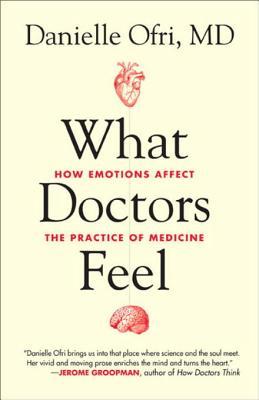
What Doctors Feel
How Emotions Affect the Practice of Medicine
چگونه احساسات بر عملکرد پزشکی تاثیر میگذارند؟
کتاب های مرتبط
- اطلاعات
- نقد و بررسی
- دیدگاه کاربران
نقد و بررسی

April 1, 2013
Ofri (Medicine in Translation: Journeys with My Patients) offers an eloquent and honest take on the inner life of medical professionals, describing not only her own bumpy path from med student to M.D., but also the difficulty of maintaining empathy for patients over the years. “Emotional layers” in medicine are more subtle and pervasive than anyone wants to believe, and they often become the “dominant players in medical decision-making,” she argues. Ofri uses the story of illegal immigrant Julia and her battle with congestive heart failure as a jumping-off point for discussing how doctors handle emotionally complicated cases. From the reluctance of Julia’s medical team to deliver her “death sentence” to a happy conclusion following the persistence of her hospital team, Ofri celebrates the rare occasions “of joy in our profession” while investigating the “documented decline in empathy” shown to begin in med school. Not every doctor becomes hardened, though many lose their way (the author describes an ER doc who was canned for being drunk on the job). Ofri heaps praise on one M.D. who sagely advises that “it is much more important to know what sort of a patient has a disease than what sort of a disease a patient has.” Ofri’s passionate examination of her own fears and doubts alongside broader concerns within the medical field should be eye-opening for the public—and required reading for medical students.

April 15, 2013
Ofri (School of Medicine/New York Univ.; Medicine in Translation: Journeys with My Patients, 2011, etc.) uses her experiences as a medical student and practicing physician at Bellevue Hospital to illuminate a side of medicine infrequently addressed: the psychological toll on dedicated doctors. The author begins with the experiences of third-year medical students, as they leave the classroom for the "the ongoing bedlam" of a hospital ward. In addition to the difficult task of learning all the medical jargon, they absorb the gallows humor that helps medical professionals deal with the constant stress that goes with the territory. They must also learn how to deal with the stench of disease--which is worse in the case of the homeless--without losing sight of a patient's humanity. Ofri ably describes the sheer terror that can occur when an exhausted intern or resident faces a cardiac arrest or other emergency. She describes an incident in her own career in her first week as a medical consultant. After her beeper went off, she rushed to the bedside of the patient (with interns and residents crowding around waiting for her directions), and her mind temporarily blanked. She explains how the fear of making a wrong decision stalks even an experienced doctor, especially when overworked and tired. To function, they must be able to suppress their emotions without losing the empathetic doctor-patient connection that is an essential part of the healing process. However, the constant stress can lead to temporary or permanent doctor burnout. Ofri also deals with what happens when doctors make mistakes. The loss of self-confidence and shame they feel is scarring, even when they receive support from superiors. An invaluable guide for doctors and patients on how to "recognize and navigate the emotional subtexts" of the doctor-patient relationship.
COPYRIGHT(2013) Kirkus Reviews, ALL RIGHTS RESERVED.

June 15, 2013
With grace, courage, humility, and compassion, Bellevue Hospital physician Ofri (cofounder, Bellevue Literary Review; Singular Intimacies: Becoming a Doctor at Bellevue) gives voice and color to the heartbreak, stress, and joy that attends medical practice. New York-based Ofri notes that medicine is about far more then science and that a physician's vision can be sharpened or misled by emotional reactions to patients. In particular, she follows the case of a long-term patient, Julia, exploring the twists and turns of her care and how she impacted Ofri's mind and heart. While this book's best feature is its raw emotional storytelling, it also addresses the academic literature on emotions and medical decision-making without overpowering Ofri's prose or interrupting her momentum. VERDICT A moving and informative read that will appeal to both general readers of books such as Jerome Groopman's How Doctors Think or Richard Selzer's Letters to A Young Doctor and to medical students and practicing physicians.--Aaron Klink, Duke Univ., Durham, NC
Copyright 2013 Library Journal, LLC Used with permission.

Starred review from May 15, 2013
Tucked inside a white lab coat or scrub suit is a welter of human emotions that can play a large role in a doctor's decision-making process. Ofri, an internist at New York's Bellevue Hospital, explores the emotional core of doctoring. Suturing together her own experiences, the plights of memorable patients, and interviews with other physicians, she examines the diverse feelingsanger, grief, shame, disillusionment, gratitude, humility, joythat can fluster or elevate physicians. Fear is a primal emotion in medicine, she writes, and doctors worry about making a mistake or even killing a patient. Sadness is an occupational hazard, and A thread of sorrow weaves through the daily life of medicine. Then there's empathy. Is it innate, acquired, or both, and why do third-year medical students lose it? Ofri exposes her emotional side as she recounts the story of a longtime patient, an undocumented immigrant from Guatemala who finally receives a heart transplant but dies shortly after the procedure. Ofri admits, Doctors who are angry, nervous, jealous, burned out, terrified, or ashamed can usually still treat bronchitis or ankle sprains competently. Yet her insightful and invigorating book makes the case that it's better for patients if a physician's emotional compass-needle points in a positive direction.(Reprinted with permission of Booklist, copyright 2013, American Library Association.)

























دیدگاه کاربران